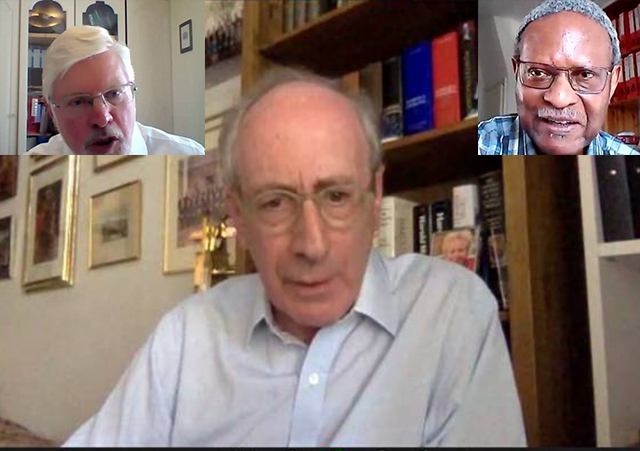 Sir Malcolm Rifkind delivered the 2022 Patsy Robertson Memorial Lecture virtually. [insets: Stuart Mole and Emeka Anyaoku]
Sir Malcolm Rifkind delivered the 2022 Patsy Robertson Memorial Lecture virtually. [insets: Stuart Mole and Emeka Anyaoku]
If anyone can reflect on the future of the Commonwealth, a wise choice would be Sir Malcolm Rifkind who, in recent times, has chaired the team which saved Commonwealth studies at the University of London amongst other Commonwealth championing work.
Sir Malcolm delivered the second Patsy Robertson memorial lecture on 19 July. The lecture is named after the Jamaican-born diplomat who served at the Commonwealth from the 1970s and died in August 2020. Meant to be the first memorial lecture delivered in person, the UK extreme heat warning forced the Commonwealth Association event online.
In introducing his guest speaker, former Commonwealth Secretary-General, Chief Emeka Anyaoku, said that Sir Malcolm was one of the few British politicians who had accorded the Commonwealth the respect it deserved.
End of empire
Sir Malcolm, a former UK Foreign Secretary, reflected on the Russian invasion of Ukraine which he described as “unfinished business” for Russian President Vladimir Putin.
He compared the Russian approach to its former Soviet Union to “the different way in which the United Kingdom approached the end of empire”. He described the growth of the Commonwealth coming out of the UK accepting the end of empire after World War Two. He said that France had experienced a more “traumatic” end of empire transition in Vietnam and Algeria.
Sir Malcolm described the speed with which the UK had helped transform empire into Commonwealth. He added that, even though there had been “a lot wrong with the Empire”, independent countries had wanted to retain their links with the UK. “They had enough in common”, Sir Malcolm said, describing the transformation as “extraordinary”.
A Commonwealth that Patsy would want – the first Patsy Robertson Memorial Lecture
The world cannot trust Putin – the Commonwealth Day 2022 lecture by Sir Malcolm Rifkind
Patsy Robertson – An appreciation
The future of the Commonwealth
Sir Malcolm had chaired a 2021 inquiry into the future of the Institute of Commonwealth Studies (ICwS) following an outcry over its proposed closure. He described it as “the only institute of its kind” and added that when the University of London had realised that it had “stirred up a hornet’s nest”, it had accepted and expanded the role of ICwS to not only look at the history of the Commonwealth but also at current issues and challenges that the Commonwealth faced.
While many have expressed concerns about the future of the Commonwealth, Sir Malcolm was optimistic, pointing out that the organisation was not just about the Commonwealth Heads of Government Meetings (CHOGMs) and the Commonwealth Secretariat at Marlborough House.
He spoke of the 100+ Commonwealth organisations which covered a range of areas, connecting the people of the Commonwealth in sports, culture, learning and technology.
During the Q&A session, he had a chance to elaborate on this, discussing the expansion to the Commonwealth to 56 members. He suggested a deferment of full membership for new applicants to allow them to put in place the basic principles of the organisation, in the style of NATO and Europe.
On the leadership challenge for the post of secretary-general, Sir Malcolm said that diversity existed in every family and that Baroness Patricia Scotland was “tough enough to take it”. Looking to the future of Commonwealth secretary-general choices, he suggested the post worked best for a person “with personality and charisma” who, even without the power to challenge Commonwealth leaders directly, can get a hearing in order to see what he or she could achieve.
“Go for the charismatic end of the spectrum”, he advised on choosing post holders, suggesting that it was not about whose turn it was to fill the post but the “calibre of the candidate”.
Commonwealth challenges
Sir Malcolm said that the skill of the secretary-general would be needed to create a CHOGM agenda which could get leaders wanting to attend.
He pointed to the strength of the Commonwealth in giving “micro states” direct access to “the big guns” which remained important in tackling climate change.
On the refusal of some Commonwealth countries to back a UN vote against the Russian invasion of Ukraine, Sir Malcolm said that analysts had to take into account the non-aligned movement to which a number of Commonwealth countries were connected and which had refused to take sides in the Cold War.
He pointed out that India, which had been condemned for not backing the US and the West, had the additional and main concern of China, not Russia.
At the start of his lecture, he had described the “great strain” the Commonwealth had been under over the issue of apartheid.
He pointed to what he called the “generosity of spirit” in bringing the Commonwealth together since 1949 with the Queen as Head of the Commonwealth and agreement in 2018 for this to extend to Prince Charles.
Sir Malcolm concluded his main address, asking his audience: “Who would have predicted (in 1949) … the size of the Commonwealth today … a vibrant organisation with an enormously important task to do?”
Debbie Ransome is the website editor for the Round Table



